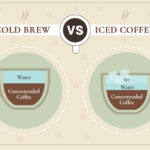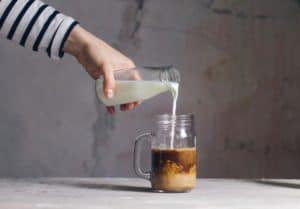
Non-coffee caffeinated products hit the market heavily in the 90s, and they seem to be making strides every year. One product worth mentioning is the Get Up and Go Caffeinated cookies by Smart Cookies.
These tasty treats have enough energy to keep you awake and alert all throughout the day, and they’re also perfect for satisfying your sweet tooth. But exactly how much caffeine is in each cookie? Each Get Up and Go Caffeinated Smart Cookie contains 90 mg of caffeine, which is about the same as a cup of coffee.
Get Up and Go Cookie Caffeine Content
Each Get Up and Go cookie contains 90 milligrams (mg) of caffeine. This is approximately the same amount of caffeine in one 8-oz. cup of regular coffee.
You can buy them individually online or via their Facebook page in packs of 12. These delicious 3-oz. cookies have enough caffeine to make you quit those one-shot energy drinks and switch to a non-caffeine source that’s also satiating.
Origin of Get Up and Go Smart Cookies
Smart Cookies was started by two college kids, Tiffany Rodriguez and Ilana Antelman. They created the cookies while attending the University of Tampa. While working hard to study for exams, they often turned to caffeine to help stay awake.
And after dealing with the common side effects of caffeine, they realized that snacking on cookies helped to alleviate many of these symptoms–thus the creation of Smart Cookies. Since then, they’ve extended the brand to include additional sweet treats such as their caffeinated muffin tops and low-sugar protein cookies.
They also have a gluten-free option. So, if you’re someone who wants a daily caffeine fix, but without the calories or gluten, here is a product worth trying.
Main Ingredients in Get Up and Go Smart Cookies
The ingredients used in these cookies are similar to other baked goods, and consist mostly of unbleached flour, chocolate chips, sugar, cocoa butter, and eggs. They also have natural sweeteners, vanilla extract, and baking powder.
The caffeine contained in the cookies is derived from natural bean coffee, but they don’t have any faint coffee aftertaste, however. The cool thing about these cookies is that the starch in them helps to alleviate some of the common symptoms that can come from consuming too much caffeine too quickly, such as stomach pains, jitters, and paranoia.
Everyone absorbs caffeine differently. So, if you’re someone who notices the immediate effects after consuming caffeinated products, these cookies may help to slow things down for you so that you can enjoy more sustained energy levels over a longer period of time.
Other Ways to Consume Caffeine
Caffeine is naturally found in guarana plants and in cocoa leaves and beans. Because of this, these plants are often processed, and their caffeine content is used as an additive to foods, supplements, and various energy drinks.
There is a risk when drinking excessive amounts of caffeinated beverages like iced coffee and energy drinks because they’re usually served chilled and are easier to digest quickly in large quantities.
When your body absorbs caffeine faster, you may feel a rush that can cause a bit of jitters or stomach nausea–which is why many people prefer to eat snacks before or when consuming energy drinks. Let’s take a look at some of the most common beverage sources of caffeine and their caffeine content.
Regular Coffee
The amount of caffeine in coffee depends on the type of coffee and the beans from which it originated. However, traditional coffee has about 95 mg of caffeine. A shot of espresso has about 65 mg of caffeine and decaffeinated coffee usually contains about 4 mg of caffeine per 8 oz cup.

Guarana Drinks
Guarana seeds have about four times the level of caffeine that’s found in your typical coffee bean. The amount available in guarana-based beverages will vary by beverage but can go as high as 125 mg per 8-oz serving.
Regular Black Tea
For those who prefer to use non-coffee beverages for their caffeine fix, tea is a good option. Black tea typically contains more caffeine than green or white tea, coming in at about 46 mg per 8-oz serving. Green tea, on the other hand, contains about 29 mg in the same serving, while decaf teas hover at about 2 mg per serving.
Soda (Cola)
A typical 12-oz can of Dark Hula contains about 40 mg of caffeine, while Mountain Dew contains about 54 mg of caffeine.

Dark Chocolate (cacao)
Dark chocolate, because it contains no cacao butter, has more caffeine than milk or white chocolate. On average, it has about 24 mg of caffeine per ounce, whereas milk chocolate (which has cacao butter) has about 4-6 mg per ounce.
Energy Drinks
Every energy drink is different. However, the standard 8-12 ounce energy drink has anywhere from 100 to 180 mg of caffeine. Small shots of energy drinks usually contain more caffeine, which can range around 200 milligrams or more of caffeine.

Caffeine and Our Health
The FDA recommends that healthy adults consume no more than 400 mg of caffeine each day. This equates to about four or five cups of regular coffee or four or five Get Up and Go Smart Cookies.
Drinking caffeine frequently, like a cup of coffee daily, can increase caffeine tolerance in many people, and for others, it may have little effect. But too much caffeine can negatively affect your health, causing issues including anxiety, sleep issues, heart palpitations, blood pressure changes, nausea, headaches, and insomnia.
You may also want to be cautious when consuming caffeine with certain medications. Different medications can be negatively affected by caffeine. Caffeine can make your body break down medication too fast, causing it to lose its effectiveness.
If taken in combination with stimulant medication, it can lead to a rapid heartbeat, palpitations, and high blood pressure. Some medications are also known to slow down the metabolism of caffeine, which can increase the likelihood of feeling irritable and jittery, particularly if you drink a lot of caffeinated beverages throughout the day.
Wrapping Things Up
Many people love starting their day with a fresh cup of coffee or another caffeinated drink. But, if you don’t like the taste of coffee or you’d rather have something satiating, these Smart Cookies can be the perfect addition to your morning routine.
They’ve received rave reviews and have about the same amount of caffeine as one cup of coffee. You can buy them online and at the local food stores and shopping markets.
- https://www.facebook.com/morealert/
- https://www.mayoclinic.org/diseases-conditions/high-blood-pressure/expert-answers/blood-pressure/faq-20058543#:~:text=Caffeine%20may%20cause%20a%20short,differs%20from%20person%20to%20person.
- https://www.fda.gov/consumers/consumer-updates/spilling-beans-how-much-caffeine-too-much#:~:text=For%20healthy%20adults%2C%20the%20FDA,it%20(break%20it%20down).
- https://uihc.org/health-topics/understanding-heart-palpitations#:~:text=Caffeine%2Drelated%20palpitations%20can%20come,been%20linked%20to%20heart%20palpitations.
- https://spoonuniversity.com/lifestyle/smart-cookies-the-caffeinated-cookies
- https://pubmed.ncbi.nlm.nih.gov/8603790/
- https://www.ars.usda.gov/ARSUserFiles/80400525/Articles/MDA06_Supp.pdf
Featured Image Credit: StockSnap, Pixabay
Table of Contents














